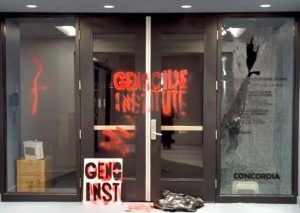On Feb. 26, Iranians will elect members to both the 290-seat parliament and the more influential 88-member “Assembly of Experts.”
On the surface, this looks like Iranian democracy in action. Yet, like any elections since Ayatollah Khomenei established the “Islamic Republic” in 1979, the upcoming ones will hardly be free.
The “Guardian Council,” a 12-member body of ultra-conservative clerics, determines who runs in either election and excludes even moderate, let alone reform-minded, candidates – and certainly those calling for political freedom and improved relations with the West.
In January, the council excluded 8,000 of 12,000 candidates from running in the parliamentary elections and allowed a scant 30 of 3,000 to run for the Assembly of Experts, which, among other things, chooses the Supreme Leader, currently the ailing Ali Khamenei.
READ: IRAN A BIGGER DANGER THAN ISIS, CONSUL GENERAL WARNS
It was this hardline council that disqualified Hassan Khomeini, the 43-year-old grandson of the founder of the Islamic revolution, as having reformist tendencies and, therefore, lacking necessary “revolutionary credentials.”
Iran’s current president, Hassan Rouhani, often called a “relative moderate,” was considered sufficiently revolutionary to run in 2013, but won on a promise to improve the economy – that is, to get biting UN-imposed financial sanctions, imposed because Iran had repeatedly violated the terms of the nuclear non-proliferation treaty (NPT), removed. This path required reaching a nuclear agreement with the international community. That was achieved last July, amid huge controversy, and was followed mid-January by the removal of sanctions when the agreement was “implemented,” after United Nations nuclear inspectors certified Iran’s compliance with restrictions to its nuclear program.
These restrictions, the key ones lasting 10 to 15 years, defer the time required for Iran to “break out” earlier to develop a nuclear weapon, a move that would cause the theoretical – but impractical – re-imposition of sanctions. Meanwhile, Iran remains a nuclear-threshold state.
At the same time, Iran benefits by the release of approximately $100 billion in previously frozen assets, unrestricted access to formerly forbidden oil markets and unlimited foreign investment opportunities. In short, Iran is open for business.
In theory, all of this should benefit Iran’s beleaguered middle class, which has long suffered under sanctions that devalued Iran’s currency and fanned inflation.
Yet much of the country’s economy is controlled by the fanatical Islamic Revolutionary Guard Corps (IRGC), which, throughout the years of sanctions, always found ways to profit from illicit trade and other corruption. Now many predict that sanctions relief will enrich the IRGC, not the middle class. Moreover, because the IRGC fears any acceptance of the West or accompanying liberalizing trends, it has clamped down even harder on reform-minded citizens, imprisoning and torturing many journalists and human rights activists.
During the most difficult economic times, the IRGC funnelled billions to its terrorist proxies, including Hezbollah, Islamic Jihad and Hamas. It will now be flush with cash to funnel even more to these groups as Shia Iran seeks to dominate the region.
Even U.S. Secretary of State John Kerry recently admitted that a portion of Iran’s sanctions relief will almost certainly be used for terrorist activities. Yet, along with President Barack Obama, Kerry believes that reaching a nuclear deal with Iran will help to bring Iran, as a “responsible” actor, back into the family of nations.
READ: OTHERS WILL PAY FOR AMERICA’S LACK OF RESOLVE ON IRAN
Again, this optimism must be weighed against the aims of the 150,000-strong IRGC, led by Gen. Mohammed Ali Jafari, who is hostile to the United States and the West. Reporting directly to Ayatollah Khamenei, he’s in charge of major aspects of Iran’s nuclear and missile development programs. On both, he has cheated in the past and almost certainly – as with Iran’s recent test firing of ballistic missiles in defiance of the UN Security Council – will in the future.
In this broader context, the results of Iran’s approaching elections may well indicate how much worse things could get – for citizens of Iran and stability in the region and beyond.






